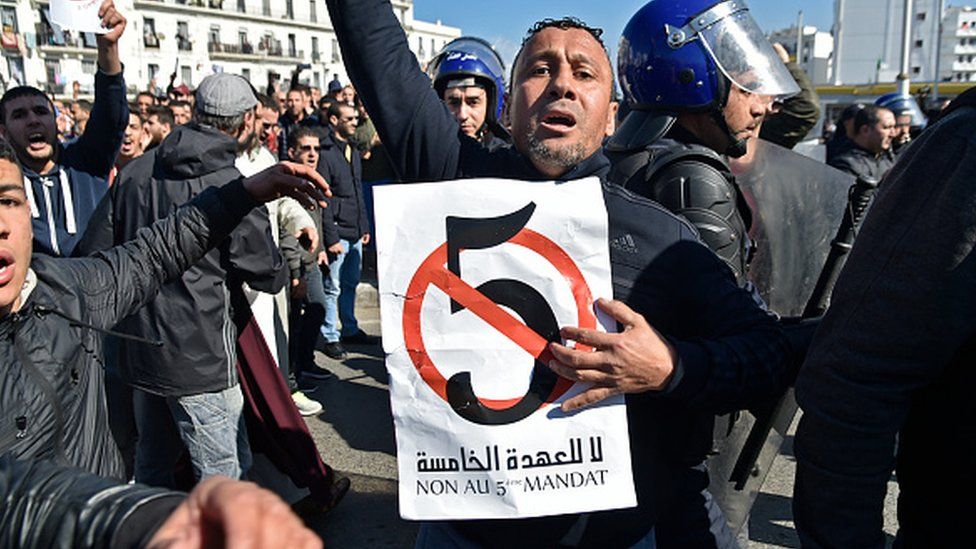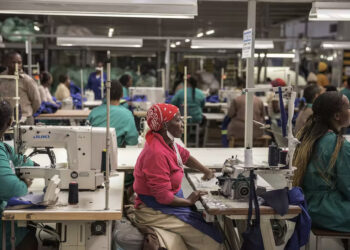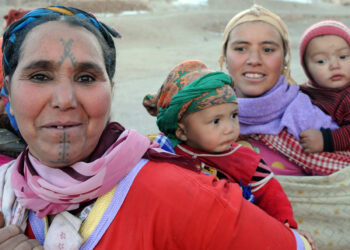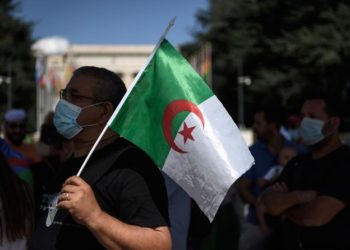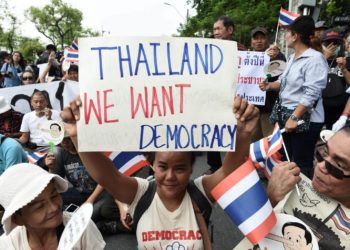Thousands of Algerian students marched on Tuesday in protest of ailing President Abdelaziz Bouteflika’s determination to stand for re-election, brushing aside his pledge not to serve a full fifth term.
Following mass demonstrations, the veteran leader promised that if he wins the April poll he will organize a “national conference” to set a date for further elections which he would not contest.
But his pledge, made in a letter read out late Sunday on state television, has been angrily dismissed as an insult by Algerians wary of his two-decade-old rule.
Bouteflika suffered a stroke in 2013 and is rarely seen in public.
Rallies demanding the 82-year-old resign have rocked Algeria since February 22, with protesters mobilized by calls on social media, in a country where half the population is under 30 and many young people struggle to find jobs.
Not Backing Down
On Tuesday thousands of university students from campuses across Algiers marched in the capital, many carrying their country’s flag.
Abderahman, a 21-year-old student, said Bouteflika “wants an extra year” in power.
“We don’t want him to stay even an extra second. He should leave now,” he said.
Police deployed across the center of the capital where protests have been banned since 2001.
"Algeria belongs to us, it does not belong to them."
Are the Algeria protests the end for President Bouteflika? pic.twitter.com/SIk4DfSixa
— Middle East Eye (@MiddleEastEye) March 4, 2019
“Hey Bouteflika, there won’t be a fifth term,” the students chanted.
Onlookers applauded them and motorists honked their horns in a show of support.
And in a sign they will not back down from protests calling on the president to resign, the students chanted “bring on the army commandos and the BRI (police rapid response squad).”
Thousands of students also rallied in the center of Algeria’s second city Oran, an AFP reporter said.
Local journalists in the cities of Constantine and Annaba said thousands more students had also joined protests, while Algerian media reported demonstrations in other cities.
The President’s Pledge
The European Commission stressed the importance of freedom of expression and rule of law, following days of protests which have seen tens of thousands of people take to the streets.
“The right to freedom of expression and assembly are written in the Algerian constitution,” Commission spokeswoman Maja Kocijancic told journalists.
“We expect that these rights can be exercised in a peaceful way and guaranteed in respect for the rule of law,” she added.
Bouteflika formally submitted his candidacy for the April 18 poll just before a midnight deadline on Sunday.
It was handed in by his campaign manager Abdelghani Zaalane as the president has been in Switzerland since February 24 for what the presidency has described as “routine medical tests.”
In Sunday’s message, he said that his pledge not to serve a full term if re-elected “will ensure I am succeeded in undeniable conditions of serenity, freedom, and transparency.”
He acknowledged the mostly peaceful protests against him.
“I listened and heard the cry from the hearts of protesters and in particular the thousands of young people who questioned me about the future of our homeland.”
But his words have failed to end the demonstrations against him which have continued daily, drawing Algerians from all walks of life, including students, lawyers and journalists.
‘No Means No!’
Tuesday’s rallies came in response to calls on social media for students to gather outside the iconic building housing Algiers’ main post office.
“No means no! Hasn’t he understood the message of the people?” asked Selma, who studies mathematics.
“Today we will make it clear for him, and again on Friday,” which has been the main day for protests, she said.
A sign held up by demonstrators read: “No studies, no teaching until the system (regime) falls,” as students were reportedly considering going on strike.
The sprawling Bab Ezzouar campus of the University of Algiers, just outside the capital, was deserted.
“There is a massive strike by students… I’ve never seen anything like it since the 1980 Berber Spring,” a professor told AFP.
She was referring to a weeks-long uprising demanding cultural rights for Algeria’s Berber community, who long fought for greater recognition for their customs and ancient language overshadowed by Arabic culture.
University professors were meeting Tuesday to decide if they too should go on strike, while some were spotted marching alongside their students in Constantine.
And the bar association of lawyers in the city of Bejaia, 180 kilometres (110 miles) east of Algiers, called on its members to follow in the footsteps of their colleagues in Constantine and go on strike.
More on the Subject
Algerian police arrested Thursday a dozen journalists protesting “censorship” of coverage of demonstrations against a fifth term for President Abdelaziz Bouteflika, as the prime minister compared the rallies to those that sparked Syria’s war.
Around 100 print and broadcast journalists, working for both state-owned and private outlets, joined the demonstration in central Algiers against reporting restrictions they say have been imposed by media bosses on the protests that broke out last Friday.
They shouted “No to censorship” and “Fourth estate, not a press that follows orders.”


